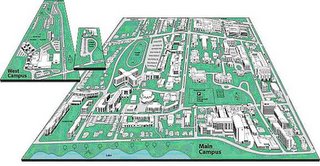Had read a book some time back called
'The Networking Survival Guide' As I read the book, I underlined a few points that caught my attention.
A few years back, I would jot these points onto a sheet of paper and file them.But now,with a blog around,I simply type them and store the information for later referal. Here are the author Diane Darling views on networking
Networking is being active. That's the ing part of the word. It requires your participation.Our network is the group of people who want us to be safe and secure-personally and professionaly.It is those who are willing to lend a hand, share an idea, champion our efforts, and, when appropriate ,challenge us to reach new heights.
Networking is
-Sharing of knowledge and contracts
-Getting the help you need when you need it from those from whom you need it
-Getting more done with less effort
-Building relationships BEFORE you need them
-Helping others
Networking is NOT
-Selling anything
-Getting a job
-Receiving a donation
-Securing funding
-You want quality contacts, not quantity.
-Remember, networking must be mutually beneficial.
-Do you have a list of MMB folks- "Make me better”-Folks from whom you can learn a lot, helps to build your confidence.
Answering a phone call in between a meeting?
Whenever there is a ring, you have a choice. At that moment, your actions indicate your priorities-Who is more important, the person you are speaking with or the person calling.It is decision time. Your decision reflects on your personal brand. It tells the other person who is more important.
In a business exchange, shift away from these topics:
-Politics
-Sex
-Religion
-Weight
-Age
-Others at work
-Inappropriate jokes that could be offensive
-Getting too personal or sharing lots of personal information about yourself.
Here are some pointers to exit from a conversation:
-Simply smile and say,”It was a pleasure meeting and/or talking to you, enjoy your morning, evening, or the presentation".
-Include someone nearby in your conversation. When the two of them begin to converse, excuse yourself and get involved in a new conversation.
-Don't lie and use typical likes "I am off to the rest room".Never leave someone alone
-Invite the person to join as you walk over to the bar or food table. Typically, you will meet at least one or two people you can include in your conversation.
A few tips to start a conversation in train/flight
- Say "Hi" at the beginning of the flight. There is an unwritten plane rule that you cannot say "Hi" in the middle of the flight.
-Help people with their luggage.
-Respect personal space.
-Hand write thank you notes.
-Highest compliment is to ask someone's opinion
-Be interested
Introducing yourself at a Networking event:
The introduction should invite a conversation and be extrememly brief-no more than 5 to 10 seconds at the most. It should include three things:
1.Your Name
2.How you fit into the situation
3.Why the other person should care.
Use words such as help, provide,contribute,give,serve,teach and solve.The introduction is about what you can do for others,not what they can do for you.Your introduction is succesful if it invites questions.If it shuts down the conversation, it was unsuccesful, and you need to rework it.
A sample introduction to introduce two members:
"Susan Jones,
I would like you to meet Jack Collins , our vice president of Marketing. Jack, this is Susan, our new manager of customer service.Jack is an avid sailor. Susan sails at the MIT Yacht Club.
Make a connection with the other person in the message as early as possible. Here are some things to be sure you say.
-Who referred you
-The purpose of the call
-Your name
-Your phone number and/or email address
-The best time or way to reach you
-Your name and contact information again.
Start with the person's name, if possible. For example, if you are calling Job because Bob recommended that you do so,start with "John, Bob recommended that I give you a call"
Sample Information interview Thank You Note
Dear Mr Jones,
Thank You for the time you spent with me, as well as your advice on transferring my skills and experience to the automobile industry.It's a very exciting field.I appreciate your willingness to have me get in touch with you after I have completed my MBA.
Thank you for your time,
Best,Joe Job Hunter
Sample Thank you after meeting at a networking event
Dear Sally,
It was a pleasure meeting you at the museum fundraiser. As promised,here is the article about sailing I mentioned. It was such a delight to meet someone who likes the sport as much as I do. I'm sure our paths will cross again.
Best, Mary Maven
Sample Thank you after first meeting with business prospect.
Dear Jack,
It was a pleasure meeting you at the technical council event. I wish you luck in your entreprenurial adventures. I look forward to our paths corssing in the future.
Many thanks,
Robert Accountant
Jeff Taylor ,founder of Monster.com said " When you are unemployed is when you deploy your network - not when you create it".
Here are some thoughts for effective networking:
-Get started: Be the one to get the relationship going. Take the initiaive. Starting is often the hardest part.Make it easy for the other person.When the other person sees your energy and get it done attitude, she or he will share the information with others.
-Create a system- Index cards,sophisticated software program.It doesn't matter -what does matter is that you use it.
-When someone comes to mind, call him or her- People like to know they are thought of and, most important, that you took the time to connect.
-Send thank you notes.
-Send articles -Don't assume that I've read an article that would be of interest to me. When you send an article, it reminds me that we share an interest. And as long as you don't stalk, you add a bit of currency to our business relationship.
Bob Metcalf, founder of 3Com corporation says "The usefellness,or utility, of a network equals the square of the number of users"
Writing and speaking are two highly effective ways to increse your visibility-and therefore your network. You get instant credibility,for example, when a newspaper or magazine publishes your article. When you speak at the professional associatioon, you get visibilty and recognition from your peers that your competteots don't. Maximize these forums for your benefirt.
Ethics at networking:
-Use somebody's name only when ou have been given permission to do.
-Preferbaly ask someone to do an e-intro or make a call introducing you.
-Itz okay to say " I met John Jones at a trade show last week and he mentioned your name.I doubt that he would remember me, since he certainly met a lot of poeple that day".
-When in doubt,underplay your connection to the other person.
A sample e-intro:
XYZ and ABC-This is an e-intro from me(Indian Blogger).The two of you should meet, and here are my thoughts. XYZ works for a company that is looking to donate a marketing tool to a non profit.ABC is the executive director of a non profit that would value your services.
Here is the contact information for both : (Include emails and phone numbers)
Over to the two of you
If you have any questions,please don't hesitate to contact m,e.
Best,
Indian Blogger .












